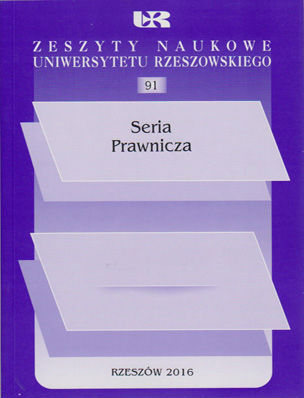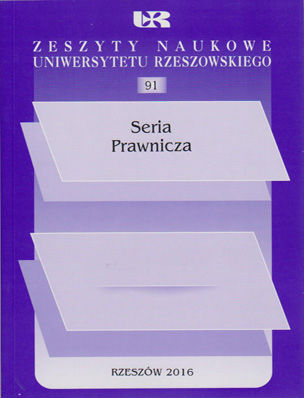













Keywords: personal data protection; Poland; Sweden
The article discusses the origin and development of the idea of personal data protection showing its sources in inherent human dignity and protection of the right to privacy coming from it. In the beginning personal data were protected merely by the institutions of civil law. The turning point comes in the seventies of the twentieth century along with raising the protection of personal data to the statutory issue. In the article there were shown two ways of development of personal data protection on the example of Sweden and Poland. Sweden as a state which is a part of Nordic tradition of a wide access to information. The first country in the world which parliament issued an act concerning freedom of information – the Act regarding freedom of the press from year 1766 and early passingof the law which comprehensively regulated the issue of data protection. It was compared to the short experience of Poland that only in 1997 passed the appropriate law in the subject matter under discussion. Constitutional and statutory regulations and the institutions serving personal data protection in both countries were collated with each other. The article was to show the legitimacy of comparative studies in the subject of personal data protection, the development that took place in both countries and the progressing process of unifying the legislation of the European Union which is significantly expressed in the legislation of the Member States.
More...
Keywords: decision-making process; Slovak Parliament; EU law
The article was analysing the contemporary problems and disputes of legislative and decision-making process in the Slovak Parliament and the concrete problem of implementation legislative rules and existence of legislative gaps in the legal system. Main legislative gaps as considered are two: the first one, possibility to adopt the act in extraordinary „shorten” procedure due to some very vaguely stated reasons for such proceeding application, and the second one, adoption of an amendment to a legislative act in the form of in-direct modification, via the substantially different law. This means a possible violation of the legislative rules and also a threat to the principle of legal certainty. As stated in the article, there is a case against Slovakia in proceedings before the European Court of Human Rights based on this legislative mistake. A certain part of the article is focused on missing procedural rules when promulgating the results of a facultative referendum as an instrument of the public voice hearing in the system. The rules are stated in the constitution in a very silent way, what lead in practice, especially in the case of the last referendum, to many questions on binding and enforcement of such results in practice. There is missing a constitutional court´s interpretation and regarding to this, there is no case law. We can refer only to the constitutional practice and general democratic principles and values, what is usually vague and inefficient practice.
More...
Keywords: guilt; civil law
For many years the problems of guilt in the civil law is an object of interest for the representatives of doctrine and practice. Despite the numerous enough literature, both national and foreign, it was not successful to reach full agreement in many detailed questions. The author presents the history of creation of the mentioned views in the Roman, French and German law. Analyzing the solutions applied in Polish legislation and literature, the author clearly differentiates the prerequisites of guilt from its elements. He considers illegality and accountability as the prerequisites of guilt. According to the author, the analysis of the elements of guilt, i.e. objective and subjective, may be commenced only after the ascertainment of the guilt prerequisites. The objective aspect covers the pattern of due diligence, whereas in respect of a subjective element, strictly subjective features of a perpetrator need to be taken into account.
More...
Keywords: Lisbon Treaty; European Public Prosecutor’s Office; EU financial policy
The Lisbon Treaty has considerably reinforced available tools to protect the European Union financial interests. One of them is a possibility of establishing a European Public Prosecutor’s Office. This organ shall be responsible for investigating, prosecuting and bringing to judgment the perpetrators of, and accomplices in, offences against the EU financial interests. There is also an option to extend the powers of the aforementioned organ to include serious crimes having crossborder dimension. In order to better understand the role that could be played by the European Public Prosecutor’s Office, it is useful to analyze some earlier proposals in this regard. At the time of writing this article, one need to understand that the institutional architecture of the European Public Prosecutor’s Office and the ways of performing its tasks are still under discussion.
More...
Keywords: Sámediggi; Sámi Parliament in Finland
The Sámi is a small, indigenous nation residing in the northern part of the Scandinavian Peninsula. Their modern territories are separated by the boundaries of four countries: Finland, Norway, Russia and Sweden. Sámi aspirations for national revival and the growing importance of protecting the collective rights of minorities in Europe led to the strengthening of their legal status and at the end of the last century to grant cultural autonomy and, consequently, the creation of Sámi Parliaments in the Nordic countries. The first was Sámediggi – Sámi Parliament in Finland, established in 1995 by The Sámi Act. It is representation of all Sámi living in this country, and its chairman in cooperation with counterparts in other parliaments in the Nordic countries and organizations of Sámi in Russia is the rotational main representative of the entire nation. Sámediggi has two main areas of action: the first is maintenance and development of language and culture and the second is political and legal status of the Sámi as the indigenous nation.
More...
Keywords: appealing justification; criminal case; Code of Criminal Proceedings
The article touches upon a possibility of appealing justification of a decision in a criminal case. The Code of Criminal Proceedings does not provide for a separate procedure of adjudicating in case of an appeal questioning exclusively justification of a decision. Independent questioning of a judgment justification is possible within the ordinary appealing means, such as an appeal and a complaint. In such a case proceedings of a court of appeal follows the same rules as in the case of a complaint challenging the content of a judgment. However there appears a certain doubt if all those legal provisions are always possible to be used directly when the complaint questions exclusively justification. The only provision referring adjudication stage in an appeal proceedings in case of a complaint questioning purely justification is art. 437 § 1 sentence 2. Such an insufficient legal regulation conduces controversies and doubts connected mainly with the objections which could be risen in an appeal questioning exclusively justification as well as with the kinds of judgment used by an appeal court in its adjudication.
More...
Keywords: authority of state power; Criminal Code of the Polish Army; coup
The article aims at defining the objects that could have been liable for committing a crime of an attempt to remove an authority of state power and an attempt to change a political system of a state under the regulations of the Criminal Code of the Polish Army (K.K.WP) from 1944. The issue is of particular importance in the post-war legislation because the provisions of the Code were used to eliminate the people with a negative attitude towards the regime introduced in Poland after 1944 from the society. As a rule, the Criminal Code of the Polish Army regulated criminal liability of soldiers as well as the other public officials determined by law. However on its basis mainly civilians were brought to criminal justice, who during martial law time purely exceptionally were subject to those regulations, unduly prolonging the period of the courts’ and military law jurisdiction in case of civilians till 1 May 1955.
More...
Keywords: Finland; constitution;
The paper is focused on a short analysis of the form of government which presently functions in Finland. It synthetically presents the new system of relations between the supreme state authorities, i.e. the parliament – Eduskunta and the government – State Council, as well as determines in this changed system a position of the head of state – the President of the Republic. Political system institutions of Finland are deeply rooted in the Nordic constitutionalism, especially in the Swedish one, because Finland was a constituent part of Sweden for over 500 years. However those institutions developed in a different way, creating original governmental and political mechanisms. It is also worth underlining that notwithstanding the Russian domination for over a hundred years Finland did not let it be russified and managed to cultivate its own traditions. It not only saved its separate political institutions but also introduced some new ones, based on the most democratic models of the epoch. According to the Eastern-Scandinavian Swedish and Finnish tradition the previous constitution of Finland was of a complex nature and included several basic laws dating from 1919 to 1951. After gaining independence in 1918 it introduced a semi-presidential form of government with a strong position of the President of the Republic. The constitutional reform of the 1990-s, which surprisingly finished with adopting of a new Basic Law from 11 June 1999 (came into force on 1 March 2000) seems to have changed that traditional for Finland model of political system by means of weakening the position of the President for the sake of strengthening the position of Eduskunta. Reflections comprised in the paper aim at proving the thesis that the Finnish form of government has been changed into a more parliamentary-governmental model.
More...